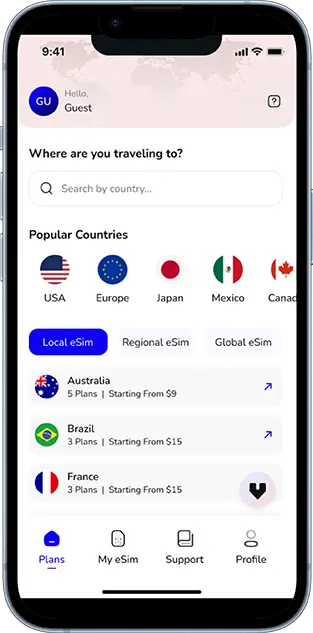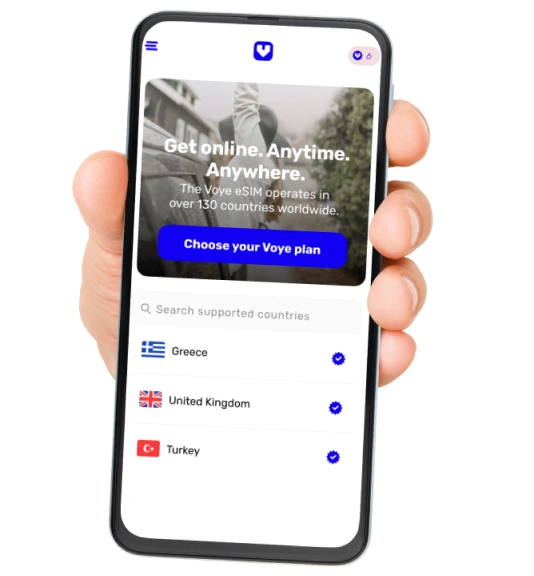Note that iPhone devices from Mainland China aren’t eSIM compatible. Also iPhone devices from Hong Kong and Macao aren’t compatible (except for iPhone 13 Mini, iPhone 12 Mini, iPhone SE 2020 and iPhone XS)
Whether you’re planning a business trip to Dubai, backpacking through Jordan, or exploring the souks of Morocco, staying connected in the Middle East is crucial. But should you rely on a local SIM card or opt for the increasingly popular eSIM? In this guide, we break down the key differences to help you make the right choice based on cost, convenience, connectivity, and flexibility.
What Is an eSIM?
An eSIM is a digital SIM embedded in your phone that lets you activate a mobile data plan without inserting a physical card. You download a profile from your provider, and you’re connected instantly. With providers like Voye Global, eSIMs offer seamless coverage across over 130 countries, including major Middle Eastern destinations.
What Is a Local SIM?
A local SIM is a physical SIM card purchased from a telecom provider within a country. It typically offers competitive rates for calls, texts, and data within that specific region, but setup can be more time-consuming, and international usage is limited.
Comparing eSIM vs Local SIM in the Middle East
| Feature | eSIM (e.g. Voye Global) | Local SIM (Etisalat, Zain, Ooredoo, etc.) |
|---|---|---|
| Activation | Instant, digital | Requires physical store visit or airport kiosk |
| Coverage | Multi-country (regional & global) | Country-specific |
| Device Compatibility | eSIM-enabled phones only | Works on all unlocked phones |
| Data Plans | 3GB, 5GB, or 8GB (3–30 days) | Varied, often cheaper for long-term stays |
| Roaming Fees | No roaming in covered regions | High for cross-border use |
| Convenience | Very convenient—no SIM swapping | SIM swap needed for every new country |
| Language/Support | English, global support | Local language may be needed |
| ID Requirement | Usually none | Passport or ID often required |
Countries Covered by Voye Global eSIM
Voye Global provides fast, reliable data coverage in:
- Bahrain
- Israel
- Jordan
- Kuwait
- Qatar
- Saudi Arabia
- United Arab Emirates
That means you can travel seamlessly across borders without ever switching SIM cards or losing connection.
Global Coverage, Local Rates
Experience hassle-free connectivity wherever you go.
Voye Global eSIM Plans
Choose from a range of flexible data packs depending on your trip:
- 3GB, 5GB, 8GB
- Validity options: 3, 7, 15, or 30 days
- 100MB free trial to test before you buy
Perfect for week-long vacations, multi-stop business trips, or regional exploration.
Data Consumption Breakdown
Here’s how much data you might use with popular apps during your trip:
| Activity | Approx. Data Per Hour |
|---|---|
| Google Maps | 5 MB |
| WhatsApp Messaging | 1 MB |
| WhatsApp Voice Call | 25 MB |
| WhatsApp Video Call | 150–250 MB |
| Instagram Browsing | 150 MB |
| TikTok | 700–800 MB |
| YouTube (720p streaming) | 500–700 MB |
If you’re using navigation, social media, and light video, 5–8GB is often sufficient for a week.
Pros of Using an eSIM in the Middle East
- One eSIM, seven countries: No need to buy a new SIM in each location.
- Instant setup: Activate from home or upon arrival with just a QR code.
- No roaming fees: Pay local rates with international convenience.
- No passport needed: Skip the paperwork at airport kiosks or stores.
- Flexible top-ups: Add data anytime from your Voye dashboard.
When a Local SIM Might Be Better
- You’re staying long-term in one country, like the UAE or Saudi Arabia.
- You make frequent local voice calls that require a traditional number.
- You need bundled talk, text, and data plans tailored to local use.
Even then, many long-term travelers use a local SIM in one slot and Voye eSIM as a backup or for cross-border data.
Your Journey, Our eSIM
Stay online abroad with instant activation.
Final Verdict: eSIM is Best for Regional Travel
If you’re visiting multiple countries in the Middle East, the Voye Global eSIM is the superior option for simplicity, coverage, and cost efficiency. It saves time at airports, eliminates the need to change SIM cards, and ensures you’re connected across borders.
Start with 100MB free at voyeglobal.com and enjoy effortless connectivity in Bahrain, Israel, Jordan, Kuwait, Qatar, Saudi Arabia, and the United Arab Emirates.
Seamless Mobile Data Everywhere
















